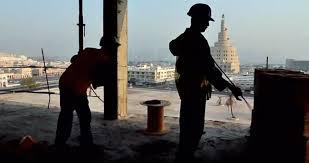By Andrew Warshaw
January 31 – The workers’ rights issue that has plagued 2022 World Cup hosts Qatar is back in the spotlight after FIFA set a February 12 deadline for the Gulf state to explain what measures were being undertaken to improve the situation.
FIFA president Sepp Blatter has already described the plight of migrant workers, especially those from Nepal, as “unacceptable” and is understood to have raised the subject with the Emir of Qatar during his visit to Doha last November.
Now, a letter from FIFA secretary-general Jerome Valcke to the newly-named Supreme Committee for Delivery and Legacy is demanding a “detailed report on the improvement of working conditions” by February 12 with “information on specific steps” being taken.
Concerns over the welfare of migrant workers employed on Qatar’s World Cup sites was first highlighted by The Guardian newspaper, followed by a hard-hitting Amnesty International analysis which condemned widespread exploitation and abuse of human rights.
The requested FIFA report will be used to prepare for a hearing on the subject at the European Parliament in Brussels on February 13 attended by FIFA executive committee member Theo Zwanziger who is in discussions with trade unions and human rights groups to try and resolve some of the issues.
“We are currently in the middle of an intensive process, which is exclusively aimed at improving the situation of workers in Qatar,” said Zwanziger who has been given the responsibility by FIFA to monitor progress. “This process will continue after 13 February and will culminate in a report to be delivered to the FIFA Executive Committee at its meeting on 20 and 21 March.”
Qatar’s World Cup organisers have already gone on record as admitting that the controversial kafala employment system, which ties employees to employers and gives the former scant working rights, needs amending and that fresh laws will be put in place well before the tournament.
But Zwanziger was forthright in his views about the current treatment of foreign construction workers.
“Ultimately, what we need are clear rules and steps that will build trust and ensure that the situation, which is unacceptable at the moment, improves in a sustainable manner.”
Contact the writer of this story at moc.l1744830670labto1744830670ofdlr1744830670owedi1744830670sni@w1744830670ahsra1744830670w.wer1744830670dna1744830670

